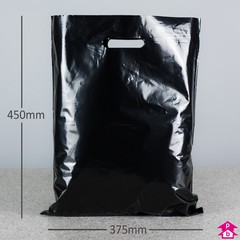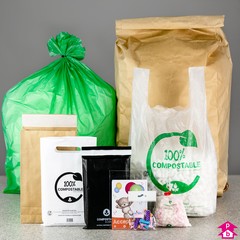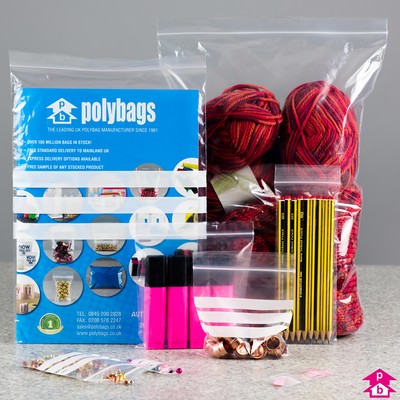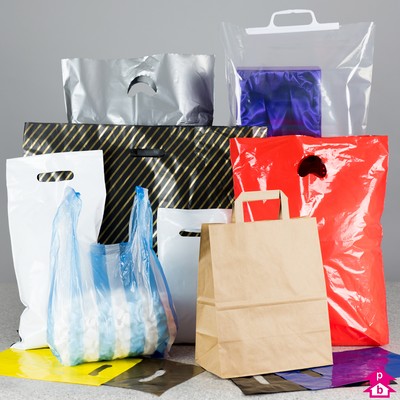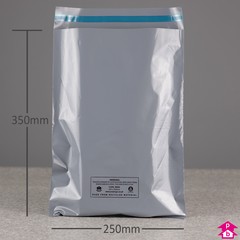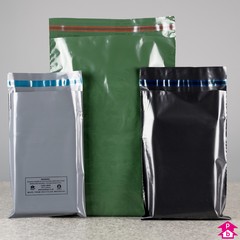375mm wide x 450mm high x 75 micron thickness
From £49.75 per 500
- 100% recycled
- Biodegradable
- Carbon neutral
- Compostable
- Recyclable
- Renewable

The Carrier Bag Tax
What is the Carrier Bag Tax?
Retailers across the UK must charge customers a minimum fee for a 'single-use' carrier bag - a government levy commonly referred to as the Carrier Bag Tax.
From May 2021, this charge is 10p in England and Scotland, and 5p in Wales and Northern Ireland.
The majority of information on this page relates to the Carrier Bag Tax in England. For information regarding other parts of the UK, see guidance for Scotland, Wales and Northern Ireland, below.
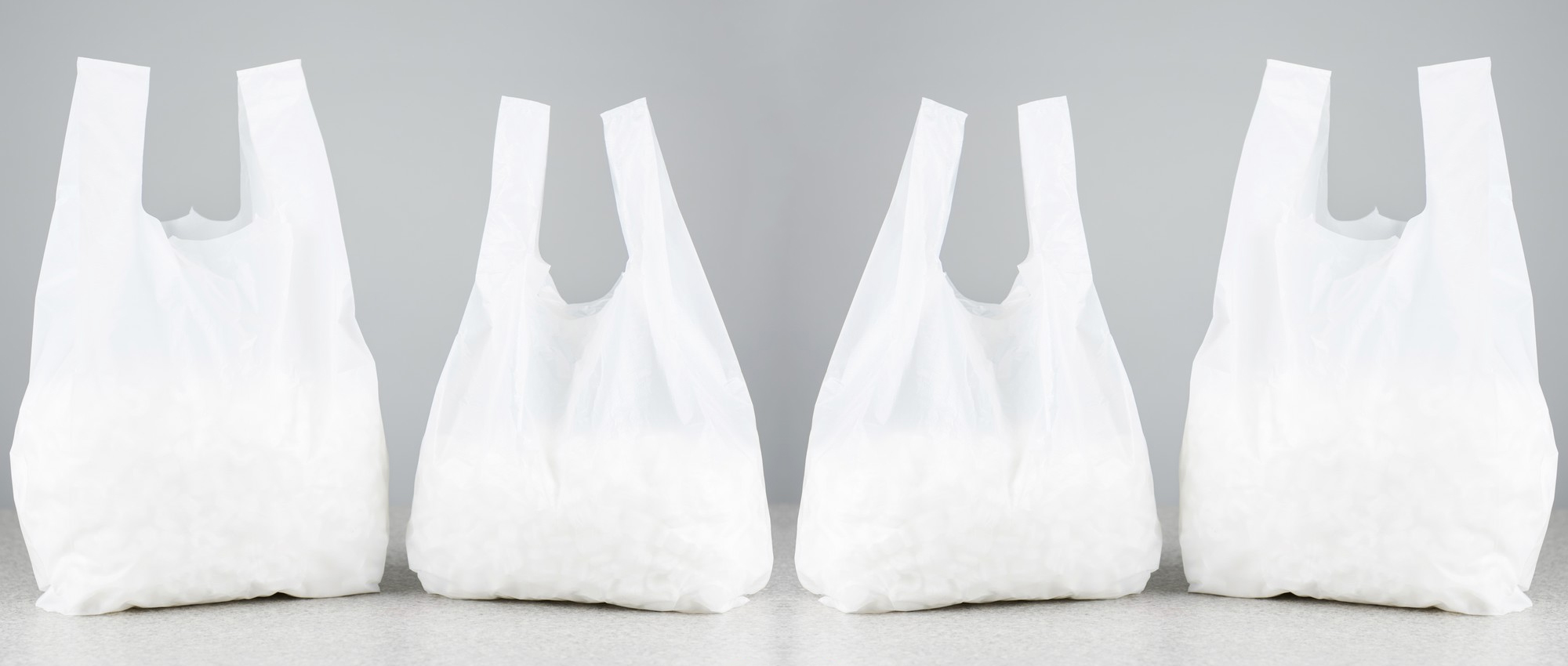
Has the Carrier Bag Tax been successful?
According to government figures, supermarkets in England supplied 7.6 billion 'single-use' carrier bags to customers in 2014. By 2019-20, this figure had reduced to 564 million - a decrease of more than 90%.
However, a 2019 report by Greenpeace found that seven of the UK's top 10 supermarkets actually increased the amount of plastic packaging they used in the previous 12 months, driven by a 25% increase in sales of 'Bags for Life' - of which 1.5 billion were sold during that period.
This suggests that many people simply switched to using 'Bags for Life' as a single-use option - a view that was supported by Morrison's and the Co-Op, who both announced a ban on sales of the thicker bags in April 2021, citing evidence that customers were using them just once.
Given the UK's poor recycling rate for plastic bags, critics have suggested that the Government use the money raised by the Carrier Bag Tax to invest in recycling infrastructure and an education campaign to promote the basic principles of 'Reuse and Recycle' when it comes to our use of all materials, including carrier bags.
After all, there is really no such thing as a 'single-use' carrier bag.

The Carrier Bag Tax in England
All retailers in England must charge a minimum of 10p for a 'single-use' plastic carrier bag.
This Carrier Bag Tax was first introduced in 2015 in a bid to reduce the use of 'single-use' carriers - and the litter they cause - by encouraging people to reuse bags.
What changes were made to the Carrier Bag Tax in May 2021?
On 21 May 2021, the Carrier Bag Tax in England was updated as follows:
- The minimum charge for a carrier bag was doubled to 10p
- The charge now extends to all retailers, including small, medium, micro and airport retailers
Previously, only large retailers - those with over 250 employees - had to charge for carrier bags, issuing a minimum charge of 5p. This levy was first introduced in October 2015.
What are my responsibilities as a retailer?
If you a retailer, you must charge:
- A minimum of 10p (incl. VAT) for all 'non-reusable' or 'single-use' carrier bags
- If you sell goods in England or deliver goods to England
- For bags used for collections and deliveries
Please also note that:
- You do not need to charge an extra 10p if you already charge 10p or more for bags
- Biodegradable bags are not exempt from the charge
- You could be fined if you do not charge for single-use carrier bags

Do I need to keep a record of carrier bag use?
Only large retailers are required to record and report the number of single-use carrier bags they sell. A large retailer is classed as one which employs 250 or more full-time equivalent employees in a year.
Do I count as a large retailer?
After deducting reasonable costs, retailers are expected to donate all proceeds from the Carrier Bag Tax to good causes or charities, particularly those who deal with environmental issues.
What bags does the charge apply to?
Retailers must charge for carrier bags that meet all of the following criteria:
- Unused - i.e. new and not previously used for sold goods (taken away or delivered)
- Made of polythene
- No more than 70 micron thick
- Has handles, an opening and is not sealed

Are any bags exempt from the charge?
The following bags are exempt from the 10p charge:
- Woven plastic bags
- Multiple reuse bags ('Bags for Life') when being replaced free of charge, if the original bag was sold for 10p or more
The above bags can still be charged for voluntarily - without the need for sales and proceeds being recorded - but you do not have to charge for them.
Returnable multiple reuse bags must be all of the following:
- Sold for 10p or more
- Suitable for reuse
- Replaced free of charge if returned when worn out
Does the charge apply regardless of what the bags are being used for?
No. If the bags are being used to carry specific contents only, then you do not have to charge for them, but if you then add a non-exempt item to the bag, you do have to charge.
e.g. If a bag is being used to carry an uncooked side of beef and an axe, you do not have to charge for it. But if you then add a loaf of bread to the bag, you would have to charge.

The charge does not apply if the plastic bags are being used solely for:
Food and plants
- Uncooked fish, meat, poultry and their products
- Unwrapped food for consumption by humans or animals
- Food in containers not secure enough to prevent leakage
- Unwrapped loose seeds
- Flowers
- Bulbs, corms or rhizomes (e.g. ginger)
- Goods contaminated by soil (e.g. potatoes)
Other exempt products
- Unwrapped blades
- Prescription medicine
- A service without the sale of goods (e.g. dry cleaning)
- Live fish or aquatic creatures
Packaging, transport and promotions
You’re not required to charge for bags that are:
- Sealed transit bags used for alcohol and tobacco
- Sealed packaging for mail order deliveries and click-and-collect orders
- Used to hold free promotional material being given away

What is classified as a large retailer?
A 'large retailer' for the purposes of the Carrier Bag Tax if one that has 250 or more full-time equivalent employees at the start of a reporting year.
The reporting year runs from 7 April each year to 6 April in the following year.
If your business employs part-time or seasonal staff and you are unsure about whether this equates to more than 250 full-time equivalent employees, you can find detailed guidance on how to calculate the exact figure on the gov.uk website.
If your business is part of a franchise, you only need to account for the employees who work directly for you, not the wider franchise. Further guidance is available at gov.uk.
What records must retailers keep?
Large retailers - i.e. those with over 250 employees - must record the following information for the whole reporting year:
- Number of carrier bags supplied
- Proceeds of the charge - both gross and net
- Any VAT in the gross proceeds
- Any reasonable costs accrued administering the charge
- What you did with the proceeds from the charge (minus reasonable costs)
Retailers must keep the above records for three years from 31 May in the next reporting year - i.e. records for the reporting year ending 5 April 2021 must be kept until 31 May 2024.
Retailers who do not keep records could be fined. Revenue and Customs guidance on VAT should also be considered.

What is the deadline for reporting records?
Large retailers must report their records to the Department of the Environment, Food and Rural Affairs (Defra) by 31 May in the next reporting year - i.e. records for the period ending 5 April 2021 must be reported by 31 May 2021.
Failure to report records by this time means they risk being fined.
Small or medium businesses may also voluntarily submit records for the reporting period. However, this is not mandatory.
Records can can reported via the Defra website.
Any data submitted by retailers will be published as Open Government Data under the Open Government Licence.
Can the public request to see a retailer's records?
Yes. Large retailers must provide copies of their carrier bag sales records to members of the public, upon request. These requests must be dealt with in no more than 28 days.

What are 'reasonable costs'?
Reasonable costs are any costs retailers have been forced to incur by following the law on enforcing the Carrier Bag Tax.
Reasonable costs may include:
- Changing in-house systems or tills
- Training members of staff
- Informing customers or staff about the Carrier Bag Tax (e.g. producing posters or leaflets)
- Obtaining expert advice on the subject
- Administering proceeds to good causes
Reasonable costs do not include any existing costs, such as the cost of the carrier bags themselves.
What happens to the proceeds from the carrier bag charge?
Retailers are expected to donate all proceeds from the carrier bag charge - minus 'reasonable costs' - to good causes or charities, particularly those who work towards a greener environment.
Between October 2015 and April 2021, the charge generated around £150 million for good causes, whilst the UK's seven biggest retailers distributed approximately 15.6 billion fewer bags.
The Government publishes a summary of results reported to them by retailers, including the amount of money given to good causes.

Are retailers subject to inspection?
Yes. Local authorities may conduct inspections of any store to ensure compliance with regulations. These can be carried out without any warning and as an anonymous 'secret shopper'. During these visits, inspectors may:
- Make purchases
- Talk to members of staff
- Demand to see records
Retailers not following regulations correctly risk breaking the law and may receive:
- A non-compliance notice, outlining what should be done to fix the problem
- A fixed penalty
- A variable penalty
- An order to publicise that they have broken the law (e.g. posters in their store or adverts in the local newspaper), with details of the penalty and what changes they have since made to ensure compliance
- An order to pay for the cost of the investigation, if they are breaking the law
What if a retailer trades in more than one region of the UK?

How much can retailers be fined?
Retailers not complying with the carrier bag charge can be fined by their local authority.
Penalties can be issued to retailers who:
- Do not charge for bags appropriately
- Do not keep records
- Do not supply records on request
- Give false or misleading information to, or otherwise obstruct or fail to assist the local authority
Every local authority must publish details of these fines - including levels and when it will impose them - on its website.
Details of all fixed and variable penalties, reductions for early payment and details of how to appeal or object to a fine are also available on gov.uk.

The Carrier Bag Tax in Scotland, Wales and Northern Ireland
The Carrier Bag Tax in Scotland
All retailers in Scotland must charge a minimum of 10p for each new single-use carrier bag, including those made from paper and some plant-based materials.
Scotland first introduced a 5p charge in October 2014. A report entitled 'One Year On', published in October 2015, suggested carrier bag usage had dropped by around 80%, which equates to around 650 million fewer bags used than in the previous year.
Scotland's carrier bag charge was doubled to 10p on 1 April 2021.
The Carrier Bag Tax in Wales
All retailers in Wales must charge a minimum of 5p per carrier bag sold in store or used for deliveries. The charge has been in place since October 2011, when Wales became the first nation in the UK to introduce a charge on the supply of carrier bags.
In September 2015, the Welsh government reported a 71% decrease in carrier bag use and 57% decrease in overall bag use, once the increased use of 'bags for life' and other reusable bags had been factored in.

The Carrier Bag Tax in Northern Ireland
Retailers in Northern Ireland must charge at least 5p for all new carrier bags with a retail price below 20p. This charge covers both 'single use' and reusable bags made of any material - not just those made of plastic.
The levy was first introduced in Northern Ireland in April 2013 for 'single use' carriers only, leading to a 72% decrease in usage in the first year. In January 2015, the charge was extended to include any type of carrier bag that cost less than 20p, including reusable bags.
What if a retailer trades in more than one region of the UK?
Retailers who trade across different regions of the UK can apply for a Primary Authority agreement. This allows them to deal with just one local authority of their choice, rather than authorities in each area they trade in.
FREE DELIVERY

250mm wide x 350mm length, 55 micron thickness. (Large Letter).
From £20.29 per 200
Bio and 100%-recycled mailing bags in low quantity handypacks.


